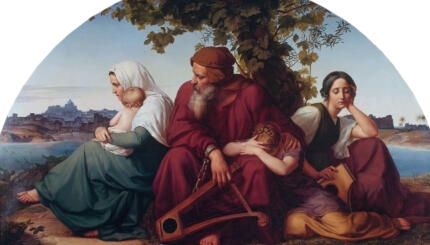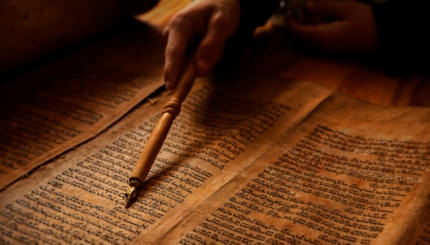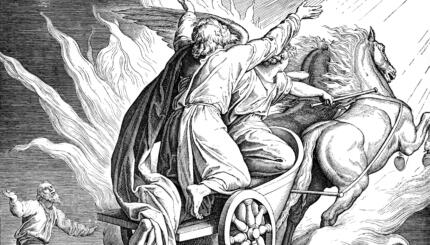Commentary on Parashat Miketz, Genesis 41:1-44:17; Numbers 28:9-15, 7:42-47
The environmental movement that has sprung forth from the West bears many imprints of the same paradigms of thought that have led to the environmental crisis itself. There is a tendency to rush towards results and overlook the process required to organically arrive at those results, and part of our work in healing is to redress these internalized ways of thinking to arrive at a truly sustainable way of living. Through the , this lesson of process can be learned.
At the beginning of Parashat Miketz we hear of Pharoah’s prophetic dream: seven robust cows devoured by seven frail ones. The signs seem clear for all to see: seven good and seven so bad they devour the good that was. It is a vision that perhaps foretells of our human endeavors with technology: a golden age of Enlightenment and invention, industrialization and higher qualities of life, now quivering under the unknown threat of today’s environmental crisis.
Why weren’t the Egyptians able to understand the dream? Upon hearing Joseph’s interpretation, it seems fairly clear. Was it myopia? Was it denial? How do we as environmentalists, aware of the “dreams” (predictions) of our scientists, share the interpretation?
The challenge of “giving over the bad news” is something environmentalists have been struggling with for the last 30 years. With news that nobody wants to hear, how do we spread the message? And as our goal is not to share bad news, but rather to inspire, motivate, and guide necessary changes that society and individuals need to make–how do we achieve this?

Help us keep Jewish knowledge accessible to millions of people around the world.
Your donation to My Jewish Learning fuels endless journeys of Jewish discovery. With your help, My Jewish Learning can continue to provide nonstop opportunities for learning, connection and growth.
Action & Spirit
The environmental movement faces this challenge to catalyze change in two distinct realms: action and spirit. In the realm of action, consumer patterns, industrial pollution, and carbon footprints are the terms of discourse and site of change.
But in a broader perspective those actions are the result of a deeper problem: an imbalance of spirit, or exile. If our lifestyle is out of balance with the ecosystems we inhabit, is it fair to assume that our inner dimensions are also out of balance? And while we are seeing great advances and potential in addressing the action side of our crisis, is enough attention being paid to the inner dimensions of disconnect?
At the end of the day, as green technologies become a greater part of public awareness and economic reality, the actions seem easier to fix, while our personal and intimate awareness of what is around us remains as disconnected as ever. How do we address this experiential exile from our Place? How do we share that the importance of a personal connection to one’s habitat–the seasons, the fruits, and the land — and the living experience of connection to a place, is really a connection to a part of our own larger self?
Acting as Ambassadors
If the vision at the opening of Miketz raises the question, perhaps we may seek an answer from the same parashah. Joseph, the favorite son who was years before left for dead by his jealous brothers, has come to power in Egypt and is in charge of dispensing the only food stores in the region. Jacob, his father, sends a “care package” down with his brothers to the ruler, gifting him with fruits of the land of Israel.
How estranged has this son become to his land and people? Jacob and his sons are playing the role of ambassador to an exiled Joseph. As environmentalists who are aware of the crisis our actions have placed before our planet, we are also in a role of ambassadorship to a society that continues down an unsustainable path.
Jacob does not point out the bad points of Egypt, rather he sends Joseph the fruits of the land. Rebbe Nahman writes that Jacob was sending this mysterious ruler of Egypt a taste of what the Land of Israel is. This is perhaps the true core of environmental work–to pass on the awareness of ourselves within our surroundings. The song of the land is a serenade waiting to be heard. Whether working with youth in the city or CEOs of multinationals, at our best we are trying to bring the voice of the earth into the equation.
The Song of the Land
When Jacob sends Joseph the package, the Torah calls it zimrat ha’aretz, the song of the land (Genesis 43:11). The translation of Onkelos understands this phrase to mean “the crops that a land is praised for.” The connection between fruits and song is a rather significant theme in Jewish agriculture. As Bikkurim (First Fruits) describes, the bringing of the first fruits to Jerusalem in the days of the Temple was accompanied by music. Elsewhere, the teaches that “song is not said except over wine (Berakhot 35a).”
The tastes of a place become indelibly etched into our memories. I have an uncle who hasn’t been to Israel in 20 years, and what I hear him asking for is “one of those Israeli tomatoes or cucumbers.” Taste is beyond words, yet somehow contains the experience of a place.
In the Torah text, the (musical notation) that hover over the shapes and dots of the letters are called the ta’amim, a word that literally means taste. teaches that these “tastes” reveal the secret meaning of the text. And when Joseph receives the offering of the tastes of his homeland, it is written in the Torah as the start of the sequence wherein Joseph begins crying for home (Genesis 43:25-50).
An experience that is by definition beyond words finds its voice through taste and song. The fruits of the land have the power to bring us back to a place of pure connection. Though a tremendous focus of environmental work is on fixing the actions of society, we don’t want to miss the deeper challenges that are at the root of our physical disconnect, for that is the source from where we will harvest the real fruits.
What is being said here is that the Torah’s choice of calling the fruits the “song of the land” alludes to a level of existence well beyond the form and atoms we know, well beyond the mere actions that we do in this world. In Kabbalah the dual existence of spirit and matter is called the “light” and the “vessels.” There is a crucial lesson therein for building sustainable forms of activism and change.
Our personal encounters with nature–quiet, sanctity, connection, beauty, etc.–are “lights” that slowly build within us, a growing awareness that can change how we act. For some people the gap between this experience of nature, and the destructive effects our lifestyles have upon it, has compelled action. The light of their experience has become a vessel. This is beautifully reflected in how Jacob tells his sons “to take from the fruits of the land in your vessels (Genesis 43:11).”
What is crucial for our own sanity as environmentalists is to refresh our source of light–to take our breaks, our in the woods, our daily reconnecting with who and where we are. And then we can share this level of experience with our neighbors and friends as a part of our path, just as Joseph shared with the Egyptians not just the doomsday prediction, but also the solution.
Any of the below “Suggested Action Items” can help foster our sense of belonging to the place we inhabit and ultimately help us to nurture the awareness from where sustainable living habits will grow naturally. The taste and song of Green living are the greatest allies in affecting substantial organic change in our patterns. For if we end up with an environmentally sustainable lifestyle but have never grown any more aware of our surroundings and our personal connection to that which is outside of us, we may be missing one of the ultimate lessons the environmental crisis is here to teach us.
Suggested Action Items:
1. Find a guide to local plants and wildlife, providing yourself with a glimpse of what was here before us.
2. Learn the local geology of your neighborhood and the natural forces that sculpted the terrain–transform walking to the corner store into a hike!
3. Discover who the native people were who grew up in harmony with the place you currently live.
4. Learn the factors in your local climates (beyond the weather forecaster) to increase success in planning outings under good weather.
5. Introduce schoolchildren to the ecosystem that exists below the asphalt and that which has developed above it.
Provided by Canfei Nesharim, providing Torah wisdom about the importance of protecting our environment.



